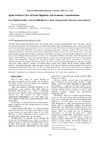Identificador persistente para citar o vincular este elemento:
https://accedacris.ulpgc.es/jspui/handle/10553/41555
| Título: | Spain trade in view of some migratory and economic considerations | Autores/as: | Ojeda-Gonzalez, Sara Mihi-Ramirez, Antonio Arteaga Ortiz, Jesus Cuenca-Garcia, Eduardo |
Clasificación UNESCO: | 53 Ciencias económicas | Palabras clave: | International trade Migration Labor and capital share ICT assets Non- tariff barriers |
Fecha de publicación: | 2018 | Publicación seriada: | Inžinerinė ekonomika | Resumen: | The importance of trade and migration flows has become pivotal in times of frequent global crises. This paper analyzes how migration and other vital economic factors explain international trade. The methodology that is subject of our study consists of a panel data analysis of trade processes measured by export from Spain and import to Spain for 90 countries and covers the period 1998-2015 with respect to immigration and other economic variables. The results show that immigration influences international trade for both sending and receiving countries. On a more detailed level, an increase of the number of immigrants [in Spain] by one per cent results in a growth of Export [from that country] by 0.3 per cent and to a rise of Import [to that country] by 0.303 per cent, respectively. Similarly, the results confirm the measure of the "number of annual hours worked" as an excellent indicator to depict the role of employment in the most recent economic changes and developments [outlook]. We also find an indirect evidence that labour productivity is relevant for international trade what supports the existence of the "Say's Law" in terms of Immigration processes. Besides, our paper shows how labour-intensive countries' environment favors export [from Spain], and by contrast, capital-intensive countries' environment facilitates import [to Spain]. Finally, the results add empirical evidence showing how the lack of technological infrastructure plays the role of a non-tariff trade barrier, whereas the membership in an integrated economic area such as EU reduces trade costs, providing incentives for exporters and importers of any particular country. | URI: | https://accedacris.ulpgc.es/handle/10553/41555 | ISSN: | 1392-2785 | DOI: | 10.5755/j01.ee.29.1.19387 | Fuente: | Engineering Economics[ISSN 1392-2785],v. 29, p. 53-61 |
| Colección: | Artículos |
Citas SCOPUSTM
4
actualizado el 08-jun-2025
Citas de WEB OF SCIENCETM
Citations
2
actualizado el 15-feb-2026
Visitas
115
actualizado el 10-ene-2026
Descargas
92
actualizado el 10-ene-2026
Google ScholarTM
Verifica
Altmetric
Comparte
Exporta metadatos
Los elementos en ULPGC accedaCRIS están protegidos por derechos de autor con todos los derechos reservados, a menos que se indique lo contrario.
